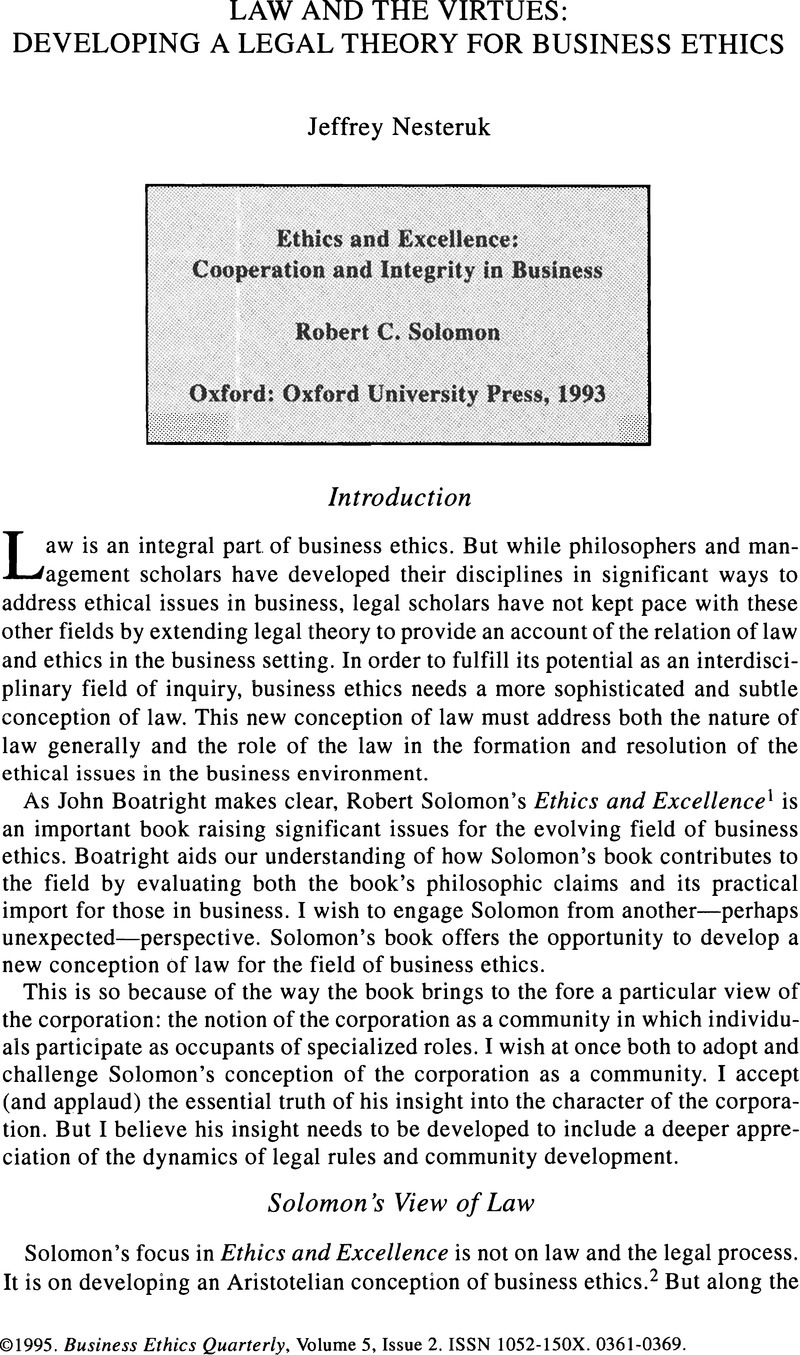Article contents
Law and the Virtues: Developing a Legal Theory for Business Ethics
Published online by Cambridge University Press: 23 January 2015
Abstract

- Type
- Review Articles
- Information
- Copyright
- Copyright © Society for Business Ethics 1995
References
Notes
* An earlier version of this article was presented at the Third Annual Meeting of the Association for Practical and Professional Ethics. I wish to thank all those who provided me with valuable comments and suggestions.
1 Robert C. Solomon, Ethics and Excellence: Cooperation and Integrity in Business (Oxford: Oxford University Press, 1993).
2 See id. at 7.
3 Id. at 127.
4 Id. at 63.
5 Id.
6 Lawrence H. Tribe, “The Curvature of Constitutional Space: What Lawyers Can Learn from Modern Physics,” Harvard Law Review, vol. 103 (1989), p. 2.
7 David Millon, “Theories of the Corporation,” Duke Law Journal (1990), p. 241.
8 Paramount Communications, Inc. v. Time, Inc. 571 A.2d 1140 (1989).
9 See Solomon, supra note 1, at 196–98.
10 Robert C. Solomon, “Corporate Roles, Personal Virtues: An Aristotelian Approach to Business Ethics,” Business Ethics Quarterly, vol. 2 (1992), p. 326.
11 Id.
12 While not wishing to develop my own view of the individual here, I should note that my view is more complicated than that expressed by Robert Solomon.
13 Bruce Jennings, “Interpretive Social Science and Policy Analysis,” in Daniel Callahan & Bruce Jennings (eds.), Ethics, The Social Sciences, and Policy Analysis (1983), p. 9.
14 Id. at 13.
15 Solomon, supra note 10, at 323.
16 For an analysis and critique of these statutes, see Committee on Corporate Laws, “Other Constituencies Statutes: Potential for Confusion,” Business Lawyer, vol. 45 (1990), p. 2253.
17 James J. Hanks, Jr., “Playing with Fire: Nonshareholder Constituency Statutes in the 1990’s,” Stetson Law Review, vol. 21 (1991), p. 103.
18 See Solomon, supra note 1, at 196–98.
19 Jay W. Lorsch and Elizabeth MacIver, Pawns or Potentates: The Reality of America’s Corporate Boards (1989).
20 Id. at 40.
21 Id. at 41.
22 Aristotle, Nicomachean Ethics, Bk. II, ch. 1, 1103a (Terence Irwin, trans., 1985) as quoted in Oliver F. Williams and Patrick E. Murphy, “The Ethics of Virtue: A Moral Theory for Business,” in A Virtuous Life in Business: Stories of Courage and Integrity in the Corporate World, 9, 18–19 (Oliver F. Williams and John W. Houck, eds., 1992).
23 James Boyd White, “What Can a Lawyer Learn from Literature?,” Harvard Law Review, vol. 102 (1989), p. 2043 n. 68 (reviewing Richard A. Posner, “Law and Literature: A Misunderstood Relation” (1988)),
24 Id. at 2043–44 n. 68.
- 5
- Cited by




